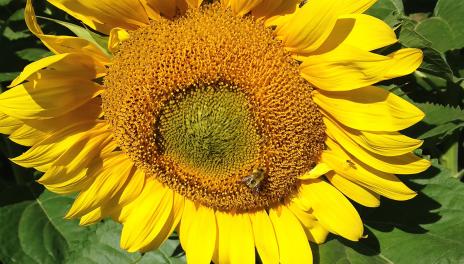Bees a Key to Controlling Head Rot in Sunflowers
Research by scientists at NDSU’s Langdon and Carrington Research Extension Centers is showing that bees are helping control Sclerotinia head rot in sunflowers.
NDSU teamed up with a Canadian company, Bee Vectoring Technologies International Inc. (BVT), to test BVT’s biological fungicide called CR-7. Researchers use bumble and honey bees to distribute CR-7, a naturally occurring fungal organism that blocks fungi from causing disease.
“The system, which has been in development for more than a decade, has bees walk through a tray dispenser (placed along with the hive with entry and exit holes) of inoculating powder before they exit their hive,” says Venkata Chapara, an assistant research scientist at the Langdon Research Extension Center.
The powder clings to the bees’ fur, and spores of the bio agent are dropped on flowers as the bees forage. When absorbed by sunflowers, the bio agent germinates and waits for the fungal pathogen to infect the flower. Once the infection occurs, the waiting bio agent infects the pathogen, which blocks the disease.
Finding a novel way to control head rot is good news because it is the most widespread sunflower disease in North Dakota and Minnesota, according to Chapara. Head rot causes severe seed yield and quality losses.
“Vectorite with CR7 gives sunflower growers an opportunity to prevent a disease that has no effective treatment on the market today,” says Ian Collinson, BVT’s sales manager. “It’s an all-natural method and allows growers to treat their fi eld without having to get in a tractor or organize a plane to drop fungicide on their crops. Sclerotinia can decimate an entire sunflower field, and our technology can prevent that from happening. The research with NDSU has been instrumental in demonstrating field efficacy of the BVT system in sunflower.”
NDSU’s collaboration with BVT started in 2016.
FOR MORE INFORMATION:
Venkat Chapara, (701) 566-3685, venkata.chapara@ndsu.edu
